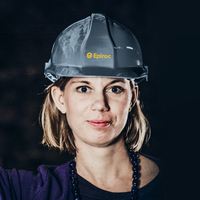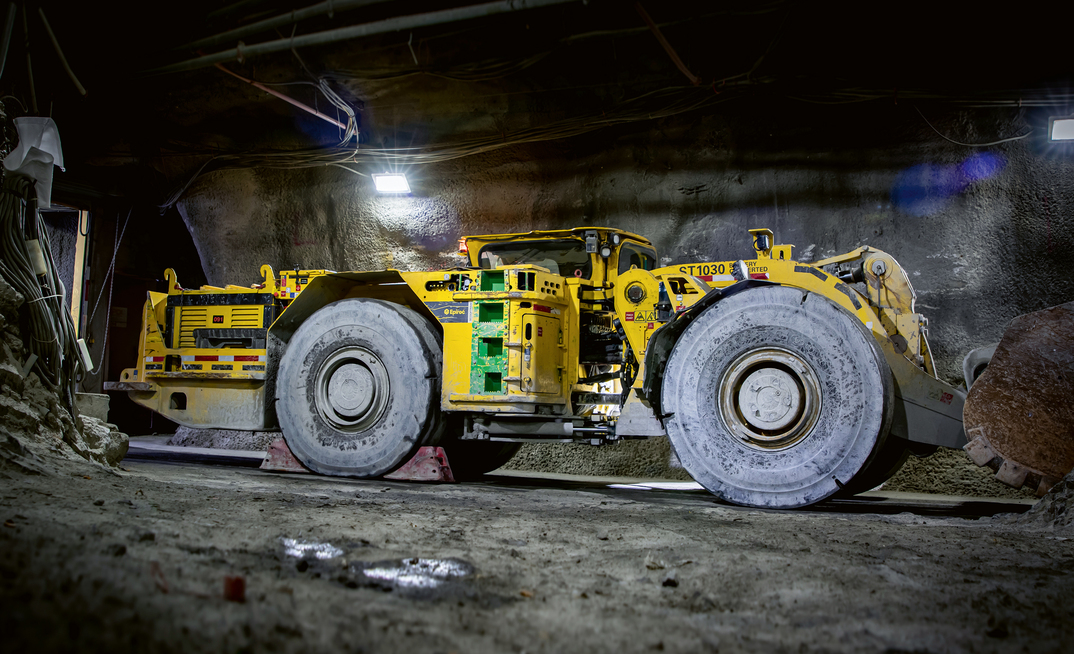"Mining has to adapt to sustainability goals and improve not only mine conditions but also the wider climate impact," she argues. "The future is electric, and we need to get to an environment where efficiency and health and safety factors are much better, and where miners can come home to their families at the end of the day and not be as tired and stressed."

Lina Jorheden, Operations Manager for Rocvolt, Epiroc
Jorheden is reviewing the progress made by the ground-breaking diesel to battery converted Scooptram ST1030 underground loader and, more broadly again, the ways in which battery-powered electrification are changing mining for the better.
A case study. In Red Lake, Ontario, Evolution Mining operates in one of the highest-grade Archean gold camps in Canada. The company aims to deliver over 350,000 low-cost ounces per annum by 2026. There, the quiet hero of the underground show is a battery equipped Scooptram ST1030 underground loader, demonstrating why exchanging diesel for modern battery cells can deliver remarkable results. Evolution's Scooptram loader is the first such diesel-to-battery conversion in North America, but it will be very far from the last as miners seek cleaner, healthier and more productive environments in which to work.
Swapping out diesel engines for batteries is a win-win all round for miners. The replacement process is elegant, simply requiring a straight swap plus the addition of electric driveline. It means that mines need less ventilation, a classic energy consumption hog. As well as getting rid of exhaust fumes, using battery power also reduces heat, noise and vibrations.
And the benefits of swapping out to battery power don't stop there. Evolution Mining and others are reaping the benefits of being able to use battery cells in more equipment beyond loaders and even retrofitting existing equipment through conversion kits.
Mining innovations
"This is all very important for usage as noise, vibrations and exhaust fumes are totally eliminated or reduced," says Jorheden.
"The mining industry is one contributor to CO2 emissions but also one of the solutions to reduce CO2 emissions in other industries," says the Swede, who worked across Africa in mining operations before returning home in 2019. "For many other industries sustainable minerals are key to reduce their emissions, you need minerals and the mining industry's output is enabling decarbonization."
For Jorheden, these changes are, quite literally, life changing.
"Electrification, together with automation, can transform the mine from a harsh working environment to something more like an office," she says. "It's a totally different environment underground: mines are closed environments, and with battery electric the working environment changes. People even complain about it being too quiet! The noise and vibration you normally experience are gone."
And of course, reducing emissions is a major goal for Epiroc.
"We have a target to reduce emissions from our equipment by 50 per cent by 2030 and that can't all be from new equipment, so we are also seeking to upgrade fleets in the field.
"Today, we are offering midlife rebuilds as part of our efforts via regional centres where staff are trained to make conversions," Jorheden enthuses. Our ambition is to produce the world's greenest machines, and our partnership with Northvolt and SSAB are steps towards this. The batteries are produced together with Northvolt who is committed to building the world's greenest batteries. Recently Epiroc also announced a partnership with Swedish steelmaker SSAB to secure fossil-free steel for use in the production of Epiroc's mining equipment.
Third-parties are also coming on board to create a dynamic aftermarket opportunity for battery conversions and broader geographic coverage. Loaders, trucks and drill rigs can be electrified and Jorheden argues that even for conservative buyers "the business case for converting is strong".
But what about that famous conservatism: don't ‘old school' miners resist change?
"That was our expectation a few years back on launch," Jorheden admits. "It's a traditional market but what actually happened was totally different. You see operators arriving onsite early in the morning to get hold of the battery-equipped machines. And the results are intimate: they come home to their family and they're not as tired."
Are there limits to the expansion of battery power? Well of course there is a cost attached and certain mines that are very hot won't be suitable for battery usage. But generally, there is very wide applicability and a clear return-on-investment equation to be seen. Mining is not even the be-all and end-all with, for example, Epiroc partnering with Railcare for battery powered maintenance of rail applications. There have also been several orders from the construction industry.
Jorheden says Epiroc/ intends to offer a complete range of emission-free underground products by 2025. And what's happening in Canada with Evolution Mining is just one aspect of a broader Epiroc vision. For example, the company offers "Batteries as a Service" Brazilian giants Vale was the first customer - meaning that miners can outsource all aspects of battery upgrades and replacements to the manufacturer so that miners can focus on mining. Old batteries are repurposed or recycled.
So in sites like Red Lake, electrification can be seen in many business but also personal effects. Companies like Epiroc are changing operations and old processes with a new infrastructure for a healthier, smarter mining. As Jorheden says, the future really is electric.
ABOUT THIS COMPANY
Epiroc
Epiroc is a vital part of a sustainable society and a global productivity partner for mining and infrastructure customers.
HEAD OFFICE:
- Address: Epiroc AB, Sickla Industriväg 19, SE - 131 54 Nacka, Sweden
- Tel: +46 10 755 00 00
- Email: ir@epiroc.com
- Web: www.epiroc.com



























